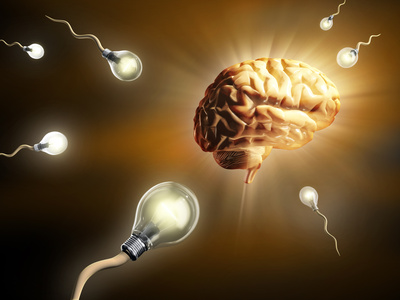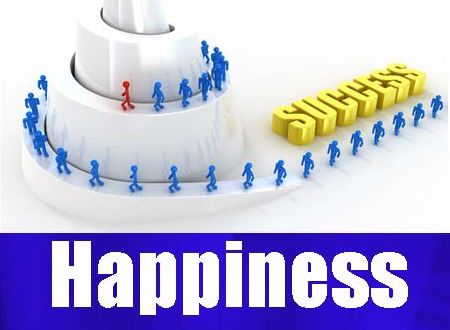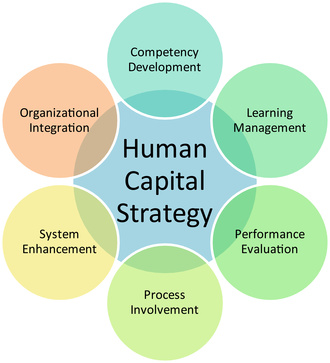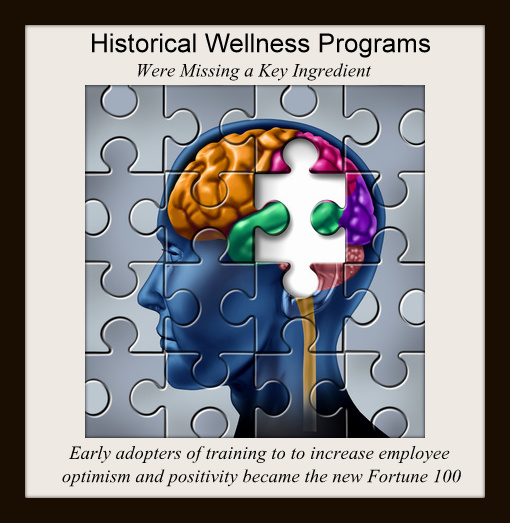Your 6th Sense
The one they will soon be teaching in schools near you
In early elementary school children are taught about the five senses, sight, smell, sound, taste, and touch. What would it be like to not understand that these senses were providing information about the world around us to help us navigate the path to our desires? What if we did not connect what the senses told us to our environment? How much less functional would that make us?
We all have a sixth sense that has been ignored. We actually have far more than five senses. The sense of urgency to use the bathroom is a sense. Hunger and thirst are senses. But this one, revealed by new research, is often ignored and that equates to lives lived far below their potential. Their potential for what? Health, happiness, great relationships, emotional well-being, success, and achievement.
New research from Harvard, courtesy of the brilliant mind of Katherine Peil, and ten pages of cross disciplinary scientific research cited in her paper, Emotion: A Self-regulatory Sense, demonstrates clearly that our emotions are a sense. In fact, her position is that emotion is our oldest sense and she uses molecular biology and the biophysical processes of living systems to lead us step-by-step through this idea.
The world is about to get much better for many people. Those who have not understood that our emotions provide us with guidance, a True North feedback guiding us to divine goodness and love, have been living in more darkness than a lack of vision would cause.
Positive Psychology has been giving us a great deal of information about the benefits of positive emotions, optimism, and happiness over the past few decades including that they reduce the risk of cardiovascular disease by 50%, improve the immune function, help us create better relationships and be more successful among many other benefits. Our website has documented benefits to individuals, businesses, charities, communities, and health with many scientific citations.
I have copied heavily from Ms. Peil’s paper with quotes indicated in italics. Please follow the link to her full paper and read it if you are at all interested in this topic. The excerpts below, while copious, do not begin to have the depth contained in her paper. The excerpts are primarily focused on information that lends itself to the import of our emotional guidance system and our best responses. The detailed science that leads to this conclusion is not covered at length via these excerpts nor are other pertinent details to a full understanding and discussion. All page number references are to Ms. Peil’s paper, Emotions: A Self-regulatory System.
Katherine Peil’s model is “the first model devoid of neurocentricity and rooted in the fundamental hard-science biophysical principals beyond the conventional interpretation of Darwinian evolution“.
“In addition to unifying many seemingly separate and unrelated bodies of literature, this model affords science a pioneering inroad into the territory of values – the “spiritual judgments’ according to the great William James (1958). (pg 22)
Much of the positive psychology literature points to feeling that we are fulfilling a larger purpose is important to individual happiness. Ms. Peil’s model provides great insight in how to obtain a sense of purpose, “the model places purpose in an evolutionary context, with both positive and negative relating to universal self-regulatory purposes to which the biovalues of all living systems are tethered. Indeed, to recognize our teleological end directed purposes is to fill a “gaping hole” in our understanding of our world and our place within it — “the intrinsic value in humankind” (Deacon, 2011). In fact, given the emerging global village, science is clearly needed to weigh in on the issue of values lest we retreat into conflicting religious fundamentalisms (Kaufman, 2008; Harris, 2010).
Ms. Peil has great courage in presenting this model which has, to my delight, presented a“much more optimistic portrait of human nature — if not of nature itself. It suggests that cohesion, cooperation and adaptive creativity are as deeply rooted in our evolutionary history as red-in-tooth-and-claw competition and random mutation. It suggests that nature is green with grace and embrace; balancing self-preservationary necessities with self-developmental synergy.”
She describes our emotional sense as “a feedback loop in a circular stimulate-response relationship where the output of a system is fed back into itself serving as stimulus for a subsequent round of output responses. It provides feedback in perfect accordance with harmful or environmental stimulus. In doing so, it accomplishes an optimizing developmental adaption – saying “yes” to beneficial changes — or a self-preservationary intervention, saying “no” to potentially self-destructive harms.”
In other words, listening to and understanding the information from our emotional guidance system (EGS) helps us optimize our self-development and helps us avoid harmful environments and situations. The guidance from our EGS is customized to our own specific goals. An individual who wants to become a nurse will receive guidance from her EGS that furthers that goal. An individual who wants to become a great ball player will receive guidance from his EGS that furthers that goal. Our guidance leads us to better feeling emotions, whether it is away from fear in a harmful environment or toward becoming the most we can imagine being. The science has been very clear that those who are stable in higher emotional states contribute more to others, their families, co-workers, communities, and beyond. They are more altruistic and more apt to lend a helping hand to friends and strangers alike. Following our emotional guidance is the way to achieve sustainably positive emotional states.
Ms. Peil’s model refutes the value of suppressive forms of emotion regulation. “In this new view our binary feel-good/feel-bad hedonic feelings remain the conscious mind’s only valid informational tether to the biophysically right/wrong conditions required for life itself. and an innate safeguard against its more volitional -yet potentially dishonest (Greene & Plaxton, 2009) — rationalizations and hypocrisies (Valdesolo & DeSteno, 2008). Instantly, they (emotions) offer both a reality check and a behavioral fix. Their elegant stimulus-response mechanics moves us to actively avoid self-destruction and create evolutionary self-development, and their simple tit-for-tat logic constantly reminds us of these dual universal purposes.”
“Moreover, suppression does not work. For whether or not the informational component of the emotional message is deliberatively and rationally incorporated into the cognitive schemata (building conscious, reasoned motives) the coupled corrective response will simply forge them into the mindscape.”
“It conceptually reunites “the self” as a functional whole bridging the gap left by the Cartesian severance of mind from body and the many illusory divides, judgments and assumptions that would follow. Particularly those that privileged reason over emotion and conscious and intentional processes over intuitive, embodied cognition and Naïvesensory perceptions.”
The HeartMath Institute conducted a study that showed the heart registered responses in a predictive manner, while the brain responded after the fact to the same stimuli.[i] Placing reason over intuition and discounting intuition has been a mistake that it is time to rectify.
“Indeed, the appraisal themes of the four basic negative emotions – loss (sadness), imminent danger (fear), contamination (disgust), and disempowering obstacles to agency or social violations (anger) – move us to either change the immediate environmental circumstances or alter our location, to “fight” or “take flight”. To which I would add: to make right, a previously unacknowledged more adaptive, creative problem solving response to emotional distress, born of the self-developmental imperative and the approach mode of behavior.”
To me the above statement found on page 14 of her paper, is the most empowering and important aspect. It highlights a higher road that humans can take from the traditional ‘flight or fight responses”. This is the path on which solutions to many social concerns we have been wrestling with for decades (and in some cases, centuries) will be solved.
“Indeed, instead of suppression or behavioral avoidance, a Right Response (RR) is one that involves an active, adaptive, rebalancing of the ecologically optimal (biophysically favorable) rational state between the organism and the environment. The RR has been captured in the stress literature as problem-focused coping (Pearlin & Schooler, 1978); Folkman, Lazarus, Gruen, & DeLongis, 1986) or transformational coping (Chen, 2006), as perhaps the most adaptive way of reducing the psychophysiological arousal tension (Haines & Williams, 1997). This can happen in one of two ways. It can involve an active adaption of the immediate external environment, which is what we call creative action or “work”, and it is how we accomplish cultural evolution.” See page 14 of the paper for specific examples.
“Likewise, the RR can also be affected to the internal environment, the personal mindscape, in conscious knowledge acquisition, in an act of deliberate learning and personal growth, an accountable answer to the distress call. Another mental tactic is to invoke optimal belief structures to reappraise (Lazarus, 1991) or temporarily endure a challenging or uncontrollable situation; or to bear an injustice or misfortune with relative grace and ‘resilience.” (Seery, 2011). This internal RR is also known as “self-control” (Tabibnia, Satpute, & Lieberman, 2008; “self-discipline” (Duckworth & Seligman, 2005), or perhaps “grit” (Duckworth, Kirby, Tsukayama, Berstein, & Ericsson, 2011), the ability to endureshort-term pain in order to cultivate long-term complex pleasure (captured by the body builder’s lament “no pain no gain). But there is a vast difference between a RR and suppressive emotion regulation, as the corrective action itself is informed by the specific emotional message, is consciously undertake, and it self-preserves through open, approach behavior, adaptive development and social cooperation.”
“In Short, the RR is a self-developmental response more indicative of the neurally well-endowed, culturally creative human being, if not all social primates. In fact, the developmental benefits of the internal RR also concern the perceived boundary between self and other, delivering what philosopher Peter Singer (1983) deems “the expanding circle” of concern for non-kin social others. This occurs when the empathic understanding of universal distress allows the broadening of one’s identity boundary such that the concerns, well-being and interests of unfamiliar others (or ‘outgroups’) become “self-relevant” as well.”
“In short, in context of the feedback cycle, despite the primacy of pain, the modern behavior toolkit includes a creative approach response as well as avoidant reactions to emotional distress. When feeling out of balance, we can take flight or fight in defense, or we can capitalize upon our neural endowments, stay in approach mode and correctively “right” the problematic agent, Indeed, the RR should be the first choice reaction and constitute the greatest percentage of all corrective responses. But, despite such efforts, unacceptable environmental conditions persist over time, then more assertive and aggressive (yet non-hostile) confrontational “fight” responses become appropriate, until finally a “flight” to more habitable and just environments becomes the only viable options. But whether the situation dictates a Right, Flight, or Flight response, the primary objective is to immediately identify and reduce the internal or external environmental conditions that are triggering the distress in order to self-preserve.”
“The complex feelings[ii] call for internal environmental corrections — righting one’s personal mindsscape as a captain would right his sailboat in response to winds of change. Indeed, when it comes to the mindscape, fight and flight defenses are tantamount to denying the wind itself, they are maladaptive, they are wrong”.
“In sum, RRs are the mechanism for conscious, intentional, and ultimately “reasoned” learning. Such optimal self-regulatory responses promote good health (Bandora, 2005), spur both individual and social self development, and create neural structures that deliver optimal feed forward control, including empathic understanding that afford others the egalitarian respect, compassion and forgiveness required by the trial and error nature of emotional sensory self-regulation. …. It should be no surprise that unresolved emotional distress is unhealthy — if not self-destructive — as an abundance of literature suggests (Sternberg, 2001; Segerstrom & Miller, 2004).”
“The good news, however, is that suppressive approaches to emotion regulation often overlook the positive eustress signals and their “Yes! Go! – This-is-good-for-me!” messages, the natural rewards for optimal self-regulation.” See page 15 for details on benefits to individuals and society.
“Indeed, the positive emotions pull us onto an optimal — right track — of life, a richly meaningful (Peterson, 2007), morally virtuous (Aristotle, 1985), spiritually integrated and evolved (Wilber, 2006; Vailant, 2008), creatively engaged, and socially connected state of flourishing (Seligman, 2011), all by simply “following our bliss” (Campbell, 2004). Indeed, the fourfold over representation of basic negative emotions is counterbalanced by a “positivity ration”, where nearly three times as many positive as negative interactions are required to prevent group fragmentation and individual languishing (Losada & Fredrickson, 2005), which I would ague, occurs naturally if we are responding ‘rightly’ to our painful emotional messages.”
“Indeed, the moral logos of the emotional sense suggests that win-win cooperation motivated by positive emotion is the long-term rule, and that win-lose fight-and-flight competition driven by self-preservationary pain is the short-term exception. Likewise, it suggests that the role of emotions such as basic anger, sadness, disgust, and complex trust, gratitude, love, and compassion have largely gone unnoticed in rationalist models of economics, game theory, and interpersonal decision making (Lerner, Small, & Lowenstein, 2004; Han, Lerner, & Keltner, 2007). In sum, it suggests that nature is green with grace and embrace, that we enjoy a self-developmental impetus for creative adaption, that evolution is constructive because of cooperation (Novak, 2006), and that as Dacher Keltner (2009) put it, we are “born to be good”.
The implications for social advancement are enormous. “In sum, the universal right track of human development delivers an optimal suite of complex emotional perceptions and a fully functional moral compass, perhaps even at surprisingly young ages, Furthermore, the moral wisdom delivered by this optimal trajectory is also echoed in common religious mores, the virtues and values identified by the Institute of Global Ethics (Loges & Kidder, 1996), the positive psychology Values-in Action taxonomy of human strengths (Peterson & Seligman, 2004,) and it resonates from within well-being advice across the mental and physical health sciences. But in terms of evolutionary theory, emotion has never been given its rightful due, and the tremendous adaptive value of positive emotion has remained obscured by the notion that all pleasure is simply the handmaiden of sexual reproduction.”
Emotions have been given a bad rap despite great scientific evidence to the contrary. See page 19 for examples. “Such slander about our visual, auditory, “olfactory, or gastatory sensory processes would be unlikely and we consider ourselves disabled unless all senses are interact yet this attitude prevails (regarding our emotional guidance sense). Clearly, we have blamed the messenger while missing its primal self-regulatory message. We have chosen to suppressively regulate our emotions instead of allowing them to regulate us. Indeed, while suppression is little more than self-deception, our cultural traditions encourage us to deny our feeling signals with strategies ranging from religious taboos and admonishments to socially refined and politically correct manners, and even to powerful psychotropic drugs. But in doing so, we’ve run our optimal moral rails onto the wrong track.”
The biological emotion of disgust, for example, is designed to apprise us of contamination, diseases, bacterial overgrowth, and the avoidance of infection threat (Curtis, 2001, 2007). “Maladaptive beliefs can harness and redirect the basic emotions to preserve ideologies rather than the body itself. . . . In short, conserving maladaptive beliefs can completely and “disregulate” our emotions (Bauneister, 1997, Peterson & Flanders, 2002, Dias-Ferreira, Sousa, Melo, Morgado, Mesquita, Cerqueira, Costa & Sousa, 2009), and ultimately help manifest the host of psychiatric ‘affective disorders’ described by the DSM. in sum, by choosing the suppressive strategy humanity has not only violated the simple directive to reduce the physical and sociocultural conditions that elicit painful emotions, but we have compromised them by adding an entirely new man-made layer of social distress to the external environment – the complex negative emotions.’
“Furthermore, given the emotional system’s ancient roots in self-regulatory signaling, such tactics are a recipe for personal disaster. As noted above, sociocultural structures that exploit negative emotion in this manner create a lingering state of distress (Dickerson & Kemery, 2004) that sets the epigenetic stage for compromised immune function, ill health, and maladaptive development. Indeed, through epigenetic pathways, stressful events become biologically embedded — they get ‘under the skin’ — during developmental windows crucial to the forging of neural circuitry (Hertzman & Boyce, 2010) as well as DNA damage that accelerates degerative aging (Hara, Kovacs, halen, Rajagopal, Strachan, Grant, Towers, Williams, Lam, Xiao, Shenoy, Gregory, Ahn, Duckett, & Lefkowitz, 2011). It is now well documented that environmental factors such as maltreatment, family adversity, marital conflict, maternal depression, and even financial distress are being linked with cognitive deficits and socio-emotional behavioral problems in children (Kahnsari, Murgo, & Faith, 1990), Burchinal, Roberts, Hooper & Zeisel, 2000; Boyce et al, 2001; Tsigos, & Chrousos, 2002; Caspi et al, 2002; Cummings & Davies, 2002; Essex, Klein, Cho & Kalin, 2002; Patel & Kleinman, 2003; Mastern & Shaffer, 2006; Van Ijzendoorn & Bakermans-Kraneriburg & Van Ijzendoorn, 2007; Boyce, 2007; Kleinman, 2010). ………..(see page 20 for different descriptions) …. but by any name, they reflect the self-regulatory feedback dynamics — and epigenetic manifestations of the emotional sense.”
So, the five senses we learned about in school was a woefully incomplete story. Our emotions are sensory output (just as the color of something is sensory output from the interpretation our brain has made about the input). Just like something that tastes bitter is communicating necessary information to us, so too do our emotions communicate information necessary to both maintain health and to thrive.
Suppressing emotions on the negative (bodily preservation) side would be akin to putting Novocain in ones hands and then putting your hands on a hot stove, you might notice that something smelled funny but you would not feel the pain of the hot stove even though your hands are burning. Suppressing negative emotions is no less unhealthy.
Suppressing emotions on the positive side (self-development) would be like eating your favorite delicious high calorie dessert while your mouth is desensitized by Novocain. You would miss all the joy of the experience and not gain the pleasure response.
Suppressing emotions is not the answer.
There are three basic proper responses to emotional output from your emotional guidance system. These are Right, Fight and Flight. Right Responses (RR’s) are by far the preferred method in most situations. Right Responses can be learned. In fact, that is the main purpose of the classes offered by Happiness 1st Institute, to teach individuals Right Responses.
This is new language to us because although we have long recognized that emotions provided guidance it was not until Ms. Peil’s paper that we had scientific support for this knowing or the term Right Responses.
Another aspect that has been well documented by many research studies is that when we become happier we become better behaved individuals. We will be posting a white paper we have been working on for a while, since before we became aware of Ms. Peil’s fabulous research, on the topic of the Importance of Understanding our Emotions. The intent is to offer a plain-English explanation.
When new information becomes available that changes the playing field, the typical slow progress of science, sometimes termed “progress by funeral” indicating it is often not until the old school has passed that new insights can be brought to light and benefit humanity is unacceptable. This is one of those times. I so appreciate Ms. Peil’s willingness to publish this paper with her meticulous research and findings that overturn many prior beliefs across many disciplines. I appreciate her ability to see the potential benefits for humanity that sharing this information can bring about and her willingness to do so.
A new sense is not really that startling. Even though schools continue to teach five senses the emotional sense is not the first new one to be known. Senses are, by definition, the physiological capacities in organism that provide inputs for perception. Far more than five are documented including thermoception, equilibrioception, kinesthesioception, proprioception, and noiception to name a few. Some natural abilities (facilitated by senses) are hunger, thirst, sense of time, fullness of stomach, need to perform bodily functions and more. I make note of this here so that the non-scientist can understand that calling emotions a sense is not far fetched. It is a new, more accurate way of looking at something we have always been aware of. This way of viewing emotions has many advantages for both scientific study and for mankind because of what it says about social problems and their solvability. We are miles closer to solutions as a result of Ms. Peil’s work.
There are many aspects to her paper including an in depth discussion of the difference between basic emotions and complex emotions. There will be resistance from many quarters to retain the status quo for a variety of reasons. This paper, when fully understood, is very empowering to individuals. It also will threaten the ‘need to be right’ that many defend forgetting that they could instead celebrate knowing more than they did when they used to think what they knew was right. A Right Response (RR) would be to understand that prior opinions and/or beliefs were based upon the best information you had at the time. It is fully appropriate to incorporate new information to support new opinions as such information comes to light. In the past you did the best you could with what you had and that is no different than what you are doing today.
In time this paper will be accepted as a historical masterpiece leading to global improvements. Further research and study will increase the already well documented evidence supporting the positions put forward in this paper.
The concept that humans are good and will behave well based upon following their own internal moral compass will be accepted in time as it is demonstrated.
For those who feel their world view is threatened by this they need only change their internal mindscape slightly to remove the threat. Doing so would be considered a Right Response and lead to self development. Within the Biblical scriptures there is great evidence to support that we have guidance so maintaining a Biblical worldview and accepting the premises put forth in this paper is not that far of a stretch. The Bible says that “God is Love”. It also said that “Man was created in His image”. If God is Love and man was created in the image of God then Man is Love. If Man is Love than Man is good. The concept of man as flawed negates our having been made “In His image”. Furthermore, there are many quotes that indicate that we have guidance. A separate document on Happiness 1st Institute’s site discusses this in greater detail, see “Are Emotions Guidance from God?”.
For those who are uncomfortable viewing the emotional guidance system as God leading the way can just see it in the biological sense. If one listens to the guidance, understands its messages and follows the guidance the same benefits will be derived regardless of whether the guidance is attributed to God or something else (at least while here on Earth and I will not take this discussion beyond the Earthly plane).
Understanding emotions as a sense has the potential to positively impact every ‘social problem’ that is of grave concern to many today.
The faster this understanding spreads and is incorporated into our policies, attitudes, behaviors, and beliefs the faster the benefits will be derived.
The science is clear. It is amazing that emotions as a sense has not been discovered/proven previously. The benefits of positive emotions, so well documented over the past 20 years, lends great support.
Positive emotions are more important to our well-being than nutrition, exercise, or even whether we smoke or not based on scientific studies and meta-analyses that have been published. There is a reason for this. We were born to follow our bliss.
Update on citations. Katherine Peil’s groundbreaking paper required expertise from several areas of science for proper peer review. Our scientific system is not set-up to take advantage of groundbreaking research that does that because they want one reviewer to be able to review the entire paper–rather than adopt an intelligent idea–having a committee comprised of experts from each field review the paper. Hopefully this will become acceptable in the future. As a result the paper was not able to be published in the original form as it was cited “in press” in various blogs on my site. It was modified and eventually peer reviewed and published in Global Advances in Health and Medicine in March 2014. I had access to early versions and many have quotes from those versions in various parts of my work. The inability to be successfully peer reviewed is not due to a lack in her work but to a lack in the current scientific norms for evaluating groundbreaking work. It was humanity’s loss that this work was delayed several years in reaching the public because of this.
[i] Rollin, McCraty, Mike Atkinson, and Raymond T. Bradley, “Electrophysiological Evidence of Intuition. Part 1: The Surprising Role of the Heart,” Journal of Alternative and Complementary Medicine 10(1) (2004), pp. 133 – 143
[ii] For a complete explanation of “complex feelings” please see Emotions: A Self-Regulatory System cited above.




















